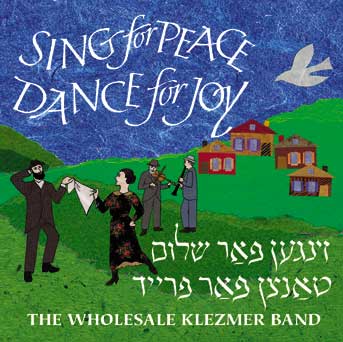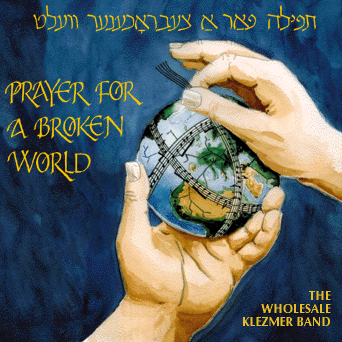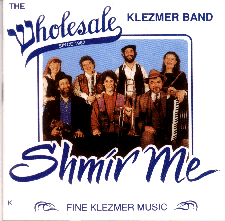The Wholesale Klezmer Band
Album Reviews
CD Review by Seth Rogovoy in the Berkshire Jewish Voice
Sing for Peace, Dance for Joy
Zingen far sholem, tantsn far freyd

For two decades the members of the Pioneer Valley-based Wholesale Klezmer Band have been entertaining audiences in the region in concerts and at family simkhes--the joyous occasions like weddings that traditionally were the raison d'etre of klezmer music. Led by clarinetist Sherry Mayrent and singer-songwriter and violinist Yosl Kurland, Wholesale favors a traditional, Old World approach to its arrangement and repertoire, as heard on its latest recording, Sing for Peace, Dance for Joy.
Yet in its emphasis on the music's deep spiritual roots -- several of the tunes included here have their origins in Hasidic nigunim, or wordless prayer melodies - and on the music's power to heal, Wholesale never leaves Judaism's prophetic tradition far behind. Kurland's Yiddish vocals have a warm, heymish quality and his new Yiddish lyrics to "Der meshiekh vet erst kumen (The Messiah Will Finally Come)" already sound like a timeless standard. The players, including trombonist Brian Bender, accordionist Owen Davidson, flutist Peggy Davis and drummer Richie Davis, complement each other telepathically, and represent the dance genres on selections including "Kolomeyke" and "Tants gemish." The album mixes familiar vocal chestnuts like "Sha, Shtil" with lesser-known instrumentals, including "Az meshiekh vet kumen." Across America there are hundreds of community-based and regionally based klezmer bands, but few if any pull off the technical demands of klezmer and Yiddish music with such apparent ease as the Wholesale Klezmer Band.
Seth Rogovoy (rogovoy@berkshire.net) is the author of "The Essential Klezmer" and a cultrual critic at the Berkshire Eagle and WAMC.
Sounds of Renewal by Ya'acov Gabriel
Copyright © 1998. Reprinted by permission from Tikkun Magazine, July/August 1998
I sat weeping in my in-laws living room this morning, listening to an extraordinary CD. It's true that I'm leaving for a sabbatical in Israel, that I haven't slept much this week, and that I just schlepped my wife, my one-year-old son, and nine bags to Philadelphia last night. I have enough accumulated pain at the moment to make anyone cry.
Still, the hot tears were specifically released by a beautiful, poignant recording called "Prayers for a Broken World" by the Wholesale Klezmer Band (Oyfgekumener Productions). This is a recording with very high kavannah (intentionality). It reproduces a set of songs, original and traditional, that were done as a concert and fundraiser for relief work in Bosnia and Rwanda. In the liner notes, the group links the Yiddish and instrumental tunes with efforts in late 1994 to stop genocide in both of those calamitous places. Aside from good intentions, the music is right where it should be. It's a little bit worn, a little bit naked, and elegantly streetwise, the way Bob Dylan and the Grateful Dead are at their best.

"Avrom tate" is a beautiful interpretation of the story of Isaac and Ishmael. To hear the song and its yearning for an end to the Israeli-Arab conflict is to know the deep power of the Yiddish language to be emotional and intuitive in expressive ways. The fact that the lead singer Joe Kurland wrote it in 1991 makes it even more amazing. Obviously, Yiddish is alive and well and living in Massachusetts.
The title song, another Kurland original, is poetically subtle. It first accuses God of being a Father too busy playing at His next creation to keep genocides from happening among His children. Then it shifts its focus and says people need to participate in repairing this world. It's not God's responsibility to heal this world, but ours. There are also Hasidic prayers and happy dance tunes, a brilliant anti-weapon poem, a story teaching tolerance between Islam, Christianity, and Judaism, and some great instrumental jams.
The group has other releases, "Yidn fun Amol" and " Shmir Me," that also balance their sense of social justice with a sense of fun. This is Soul Music with a heimish (down home) intelligence that really delivers.
Another kind of soul explorer is Wally Brill........[ a review of Wally Brill's new album appeared at this point in the article and is omitted here.] ...
What both these projects have in common is a respect for the musical past without it limiting one's creative horizons. That's what makes them Renewal, and that's what makes them enjoyable.
top of this page
Recordings by the Wholesale Klezmer Band.
Gan Eydn Home Page
New Wholesale Klezmer Band CD offers a musical remedy
Tfile far a tsebrokhener velt (Prayer for a Broken World) (1996)
The Wholesale Klezmer Band
Oyfgekumener Productions
OYF004CD
By Sharon Desmond Paradiso
There's something about folk music of any description that touches both heart and feet -- even while you're nodding at the timeless truth of the words, your toes start tapping and you just have to move. Klezmer music takes this to the next level -- and the Wholesale Klezmer Band, with their new CD Tfile far a tsebrokhener velt (Prayer for a Broken World), takes it to the next level yet.
The Wholesale Klezmer Band, under the musical direction of Sherry Mayrent, was founded in 1982 by vocalist and violinist Yosl (Joe) Kurland, Richie Davis who plays percussion, and Owen Davidson, who plays accordion, domra, and guitar, and who contributed the cover illustration. Since then they bave been joined by Brian Bender on trombone, Lynn Lovell on vass viol, and Peggy Davis who plays flute and who provided the calligraphy for the cover art.
Their approach to klezmer is more traditional than many bands of the so-called "Klezmer Revival" of the past 15 years. As Kurland pointed out in a recent interview with the Jewish News "In America, there has been some sort of cross pollination between klezmer and jazz, but we avoid that. We base our model on a much more European sound, an older sound." And perhaps older themes as well.
The theme of Tfile far a tsebrokhener velt is nothing less than tikkun olam (healing the world) itself. The wars in Bosnia and Rwanda in 1994 provided the inspiration for the group to produce a concert to benefit non-sectarian felief in those two areas. By 1996, when the CD was released, uneasy peace had come to Bosnia, yet the message, the band realized, was still appropriate, given the conflicts still arising all over the world (and not least of all, in Israel). So the band did a little tweaking?replacing a Bosnian song with a Yiddish one, and renaming "Prayer for Bosnia" to "Prayer for a Broken World."
The result is this stunning volume that answers the question asked at the beginning of the liner notes: "How does a Jew respond to news of genocide in the post-Holocaust world?"
How indeed. It's all well and good to decry the sadness, but going about repairing the world takes a little more than easy emotion. That's why klezmer music in general and the Wholesale Klezmer Band's approach in particular works not simply to point to the horror, but to remind us that despair is a useless response. To repair, one must find a little joy.
"Just as you break a glass at a wedding to remind you tht the world is in need of repair," said Kurland, "I think that the Jewish world outlook says that all joy is mixed with sadness, and sadness is a place to reflect and find joy as well."
Hence the CD begins with the raucous "Khsidim tants: ("Dance of Chassidim"), with Davis' boisterous beat and Bender's strong trombone glides. Likewise, the album ends with "Khevre nit gezorgt: ("Friends, Don't Worry"), which following "The Chassidic Kaddish for the Conclusion of Ne'ileh," reminds us that despite the sadness, we must also feel joy in being alive. In fact, even the musical setting for the Kaddish conveys this feeling. If you didn't know the prayer, you might believe that this was some kind of drinking song, such is the vigor and force of the music.
In between these cuts lie the meat of this CD. "Avrom Tate" ("Abraham Papa"), a midrash on the story of Isaac and Ishmael, works to illustrate the border disputes that go on not only in Bosnia but in Israel, Rwanda and other war-torn areas. "Dremlen Feyglekh" ("Drowsing Birds"), a lullaby to a Holocaust orphan, gives voice to the injustice visited upon the most innocent victims of war, children. Its mournful refrain, "lyu-lyu," is sung by Kurland with a typically klezmer breaking grace note, making it sound more like crying than crying itself. And "Tfile Far a Tsebrokhener Velt" is a demand that G-d explain these atrocities that get visited upon this broken world.
Kurland wrote "Tfile" as part prayer and part argument with G-d. "It just feels to me that Yiddish is the only language in which you can [argue with G-d] lovingly but forcefully," he said. "Sometimes, if I first try to say some of the things that I want to say in English, and especially poetically in English, it comes out feeling sort of trite or weird. To say them in Yiddish, it feels beautiful, it feels appropriate, it feels that this is the language for saying such things. The words are there for that." Thus the bitterness of the English:
Dear God, you are so busy, making pretty lights for us,becomes, in Yiddish, more plaintive:
"And You have sanctified us with Your commandments,"
That we should fix the world You created
Ziser tate, bist farnumen, du makhst undz sheyne likht,particularly with "v'kid'shonu b'mitzvosov" repeated rapidly over and over again.
V'kid'shonu b'mitzvosov, mir zoln dayne velt farrikhtn
There are two spoken-word pieces on the CD: "The Spear and the Needle," in which a weapon of death and an instrument of creation disparage each other's purpose, and "The Magic Ring," which the liner notes describe as "a lesson in tolerance for different religions." In other hands, the effect of these stories could have been didactic and heavy-handed, but Kurland's theatrical renditions and Mayrent's and Davidson's musical accompaniment to "the Magic Ring" ensure that these pieces fit with both the theme of the CD and the feel.
Davidson's cover illustration, of human hands wrapping a cracked (but not shattered) globe with bars of music, is a visual complement to the message of this album. Tikkun Olam is not a mandate to perform miracles, only to do what we can. With Tfile Far a Tsebrokhener Velt, the Wholesale Klezmer Band did perform a little miracle: by doing what they could do, and doing it so beautifully, they show us that what we do can have an impact too.
Copyright ? 1997, by The Jewish News of Western Massachusetts. Reprinted by permission.
top of this page
Recordings by the Wholesale Klezmer Band.
Gan Eydn Home Page
From Dirty Linen
, Folk Music Magazine
April-May 1993:
Copyright © 1993, Dirty Linen. Reprinted by permission.
The Wholesale Klezmer Band
Shmir Me
Oyfgekumener Prod. OYFD02 (1992)

What's the old saying, "you don't have to be Jewish to like..."? The Wholesale Klezmer Band has a great sense of humor from the Levi Jewish rye-bread style logo to their outstanding collection of traditional and original material. In spite of all the humor, it is clear that the Wholesales have a deep understanding and reverence for Yiddish culture and language. They're no slouches when it comes to their vocals or instruments, either, they mix accordion with balalaika, flute, percus sion, viola, violin, bass viol, trombone, clarinets and guitars for an authentic and lively brand of music.
The title track "Shmir Me" tells a tale of Yankel, who goes from being a fine (if not whiny) little boy to a defense and weapons systems lobbyist in Washington. He goes from "Shmear me a little bread with butter: to "Shmear me a little money in my palm."
Elsewhere and on a more political note they do a heartbreaking rendition of "Der Strayker" ("The Striker") about the Jewish labor movement and social justice.
I am a striker
I strike for a better world
I struggle gladly
Against the hand that blocks my way.
They can cut a rug well with a lively Rumanian dance tune as "Mamalige" or an equally lively self-penned klezmer tune as in the "Wholesale Hora." It is the balance they achieve between social understanding and social satire that marks The Wholesale Klezmer Band as a truly great klezmer band. Who else would come up with "The March of the Unemployed"?
Notes are given about each tune and lyrics are provided in both English and Yiddish. If you're already a klezmer music fan, this is an essential addition to your collection. If you are a newer fan, like myself, here is a great introduction to a rich, deep, and yes, at times very humorous tradition. [MA3656]
Lahri Bond (Hadley, MA)
top of this page
Recordings by the Wholesale Klezmer Band.
Gan Eydn Home Page

